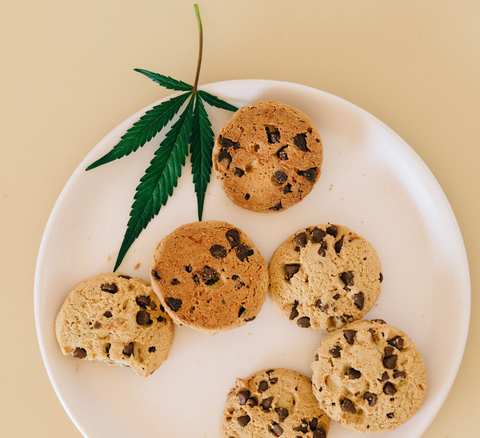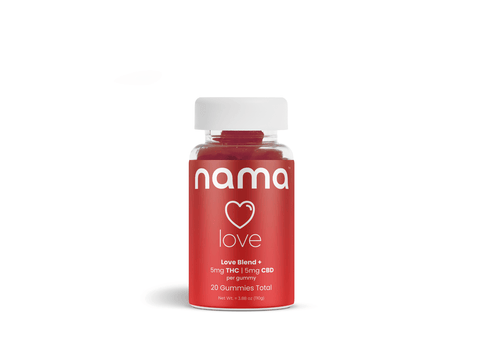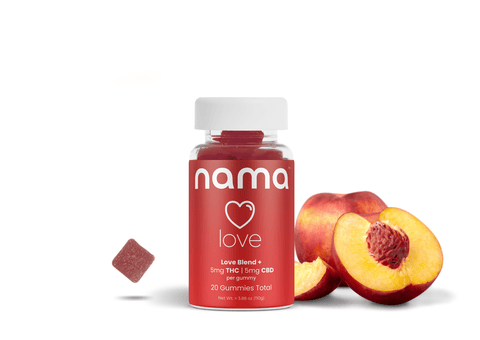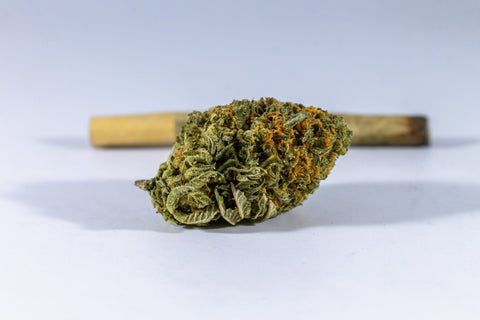
If chronic headaches are disrupting your life, microdosing cannabis can relieve the pain. But if you go overboard, you may cause the opposite effect.
Cannabis contains compounds that can both ease or provoke headache pain—the secret is in the dosage.
Microdosing THC and CBD seem to relieve all sorts of pain, from neuropathic and sciatic to migraines and cancer pain. Take too much and you can disrupt your entire endocannabinoid system (ECS) that regulates pain and mood, leaving you with a splitting headache.
The key is moderation. With our carefully dosed THC edibles, cannabis enthusiasts can chill without the unpleasant head thrills.


THC: 10 mg | CBC: 10 mg | CBD: 10 mg | CBG: 5 mg | CBN 5mg
Can cannabis cause a headache?
Cannabis has many proven health benefits. Many people have started taking small, controlled doses of cannabis to help them sleep better, alleviate nausea and anxiety symptoms, focus, and even relieve migraines. We’re talking super small amounts here, between 2 and 10 milligrams of THC per serving.
When you consume doses higher than 10 mg, cannabis may give you a headache. Because THC influences the receptors in your brain, taking too much results in an overstimulation of your senses, leading to a wide range of adverse effects other than head pain.
- Intense intoxication, known as the “high”
- Impaired cognition
- Slowed coordination
- Fatigue
- Nausea
With these high doses, you may often feel an immediate onset of effects and a headache that usually begins within an hour of consumption.
Why don’t edibles cause headaches?
Cannabis edibles are delicious treats infused with small amounts of cannabinoids. They have become the go-to choice for many seeking the therapeutic benefits of cannabis without the hassle and dangers of smoking or vaping.
It’s not just that they are tasty and convenient, but they offer a consistent, controlled way to consume cannabis. When you munch on one of our gummies, you're getting just a bit of THC alongside other beneficial cannabinoids such as CBD. The key is to balance the ratios and infuse our edibles with low doses as high THC levels can often cause those pesky headaches.
Edibles also allow for a more gradual and consistent release of cannabinoids into your system. Unlike the instant onset of effects you get with smoking, edibles take their sweet time to release the THC, kicking in anywhere between 30 minutes and two hours. This delayed onset of effects is perfect if you want to avoid a headache: instead of a sudden spike in THC levels, you get a nice, gradual elevation that provides a smoother and more controlled experience.
(The effects of our THC edibles also last way longer than your average smoke, so that’s another reason to start microdosing with edibles and ditch the cigarettes.)
Whether you're a daily connoisseur of cannabis edibles or just an occasional enthusiast, their low and controlled doses of THC are designed to keep you away from the land of headaches and discomfort.
What does a cannabis headache feel like?
The cannabis-induced headache can closely mimic the symptoms of migraines or tension headaches. The pain can be short-lived, giving you literal headaches for a few hours only, or persist like traditional migraine headaches if untreated.
Here are some of the symptoms you may experience if you indulge in too much cannabis:
- Throbbing or pulsing pain on both sides of the head.
- Pain originating in the forehead or temples, spreading to the back of the head and neck.
- Sensitivity to light and sound.
- Nausea or vomiting in some cases.
- Dizziness or lightheadedness.
Many people also experience the aggravation of headaches when they engage in any type of physical activity. They often feel the need to rest in a dark, quiet room, and wait it out. While that may be a solid strategy, we can do one better: avoid high THC doses and turn to microdosing.
Our low-dose Energy gummies are a delicious way to start your microdosing journey (and relieve a headache or two). With only 2.5 mg of THC, these vegan, blood orange-infused edibles
What can cause a cannabis headache?
Cannabis can either alleviate or provoke headaches depending on how much you take. While lower THC amounts are therapeutic, higher amounts seem to over-activate receptors in the ECS that disrupt normal endocannabinoid signaling.
While the dosage of key cannabinoids seems to matter the most, there are other factors involved.
- Dehydration. High levels of THC can dehydrate your cells, which makes your headache and migraine pain worse.
- THC’s vasodilatory effects. THC dilates blood vessels. This causes headaches in some users because the changes in blood flow may activate migraine pain.
- THC impacts serotonin. Serotonin is an important neurotransmitter that regulates mood, pleasure, and pain perception, among other things. While microdosing cannabis boosts serotonin, excessive amounts cause irregular serotonin signaling that could disrupt natural pain relief.
- Imbalanced THC to CBD ratios. THC’s potential psychoactive effects can trigger adverse effects, including headaches, especially in higher concentrations, while CBD tends to counteract some of those intense effects. When the THC to CBD ratio is skewed towards higher THC content without sufficient CBD to balance its effects, it can amplify the likelihood of headaches.
This is exactly why our full-spectrum CBD products are the best edibles to prevent headaches and boost the benefits. They contain balanced ratios of THC and CBD—in low doses, of course—that synergistically work together to harness the therapeutic potential of both cannabinoids.
The so-called entourage effect THC and CBD produce together can potentially prevent headaches while amplifying the overall health benefits and reducing the likelihood of adverse reactions commonly associated with higher doses or imbalanced ratios. Order our full-spectrum gummies and experience the perfectly calibrated THC-to-CBD ratios.
Do you want to learn more about cannabidiol? Check out this comprehensive guide to CBD and learn how this potent cannabinoid can promote relaxation and pain relief.
Product QUIZ
Need help deciding what product is best for you? Take our quiz, just three questions until your perfect match!
How does cannabis treat pain?
Cannabis has been around for hundreds of years and served as a potent analgesic (pain reliever). At low doses, cannabis can actually treat and prevent headaches.
THC modulates ECS to reduce pain
Cannabis interacts with the ECS to modulate pain signaling and inflammation. To relieve pain, Delta 9 THC interacts primarily with CB1 cannabinoid receptors. This reduces the sensation of pain at the source and limits the ability for pain signals to reach the brain.
Cannabis also modifies the way you process pain in the brain itself, decreasing your perception of pain and anxiety associated with chronic pain.
[Endocannabinoids] modulate neural conduction of pain signals by mitigating sensitization and inflammation through the activation of cannabinoid receptors that are also targeted by Δ9THC. CB1 receptors modulate neurotransmitter release in the brain and spinal cord. (Hill, et. al.)
In addition to modulating pain signaling, THC can also reduce inflammation throughout the body which can help minimize headaches and other pain. To lower inflammation, THC activates CB2 cannabinoid receptors found abundantly on immune cells like macrophages. This initiates a molecular signaling cascade inside these immune cells which further shrinks the sensitization of pain receptors and pathways, making them less reactive to stimuli.
CBD reduces pain through indirect ECS activation
Unlike THC, CBD does not bind to the cannabinoid receptors directly. Instead, CBD inhibits the enzymes that break down naturally occurring endocannabinoids, increasing their concentration and prolonging their effects. CBD also reduces inflammation, which leads to less sensitization to pain.
Vučković, et. al. suggest that CBD antagonizes cannabinoid receptors in the presence of THC, lowering inflammation and decreasing the transmission of pain signals by influencing the activity of key neurotransmitters involved in pain.
Cannabis influences pain-modulating neurotransmitters
Cannabis influences key neurotransmitters involved in pain perception, most notably serotonin and dopamine. THC and CBD increase serotonin to change how the brain processes and responds to pain signals, reducing perception of pain.
Cannabis also causes a surge in dopamine activity. Dopamine normally provides natural pain relief by inhibiting pain signaling at spinal and supraspinal levels. Influenced by cannabinoids, dopamine reduces the ability of pain signals to reach the brain.
The changes in serotonin and dopamine activity transform how neurons communicate about pain, essentially reprogramming your brain and nervous system to downgrade the suffering and discomfort associated with all types of pain.
THC’s mildly euphoric feelings change our pain perception
The interaction between THC and CB1 cannabinoid receptors seems to alter the body’s perception of pain and reduce pain sensations. Low doses of THC can produce mild euphoric effects that positively influence pain perception and act as a natural pain reliever.
This occurs because THC triggers the release of dopamine which changes mood and provides an overall sense of calm and wellbeing. This pleasant euphoric state acts as a distraction from pain, reducing the attention and focus on discomfort. The euphoria essentially signals the brain to downgrade the severity of painful stimuli and enhance enjoyment despite pain.
If you want to feel the sweetest euphoria, our Euphoria Delta 9 gummies will get the job done. Ten milligrams of THC are enough to uplift the spirits and improve your mood without pushing you overboard. With these strawberry-infused edibles, chronic migraines are a thing of the past.
How to prevent cannabis headaches
You certainly can enjoy cannabis and all its therapeutic effects without headaches, intoxication, or other adverse effects. Here are some effective strategies to keep those headaches at bay:
- Choose low-dose edibles or THC-infused drinks over smoking or vaping. Our gummies and mixers offer a more controlled, gradual release of cannabinoids into your system, minimizing the risk of sudden THC spikes that can trigger headaches. Our Delta 9 gummies for pain contain carefully measured doses of THC and CBD to fight anything from migraines to nerve pain. If you want to bring out the fun at your next party without the morning-after hangovers, order our liquid Buzz drops to infuse your favorite mocktails with.
- Start low and go slow. Whether you're new to cannabis or just trying a new product, begin with a small amount and gradually increase your intake. This helps your body acclimate to the effects of cannabis without overwhelming your system, potentially lowering the chance of a splitting headache.
- Stay hydrated. Cannabis, especially THC, can lead to dehydration if consumed at higher doses. Even if you lower your THC intake, if your body craves fluids, your head will be the first to tell you. Keep yourself well-hydrated and prevent headaches triggered by dehydration.
- For the best results, use edibles rich in THC and CBD. Remember the entourage effect? We weren’t kidding about that. CBD has been known to counteract some of the adverse effects of THC, such as intoxication and headaches. Our entourage effects gummies contain balanced ratios of CBD and THC for a more harmonious experience without unpleasant surprises.
- Avoid stressful environments. It’s easier said than done, but external factors such as chronic stress, feelings of worry, and anxiety can contribute to headaches. If you need help relieving tension, microdoses of THC and CBD may promote relaxation and potentially mitigate the impact of stress on your body. A calmer state of mind leaves no room for migraines.
Our edibles are incomparable in taste and quality. But sometimes all we need is a glass of one cold, aromatic cocktail to lighten up our mood and bring the fun out. Did we say cocktail? We meant: buzztail!
THC drinks are another great, edible way to enjoy small amounts of cannabis. Just add a few drops of our liquid THC mixture to your favorite non-alcoholic beverage. Its mild buzz can effortlessly elevate your mood without the risks associated with excessive alcohol consumption.
There’s nothing easier than mixing up your own cannabis drink, so explore our collection of the best THC-infused mocktails and have some fun.
Where can I buy the best THC edibles?
Looking to try Delta 9 gummies for the first time? You’ve got to be smart about where you purchase your edibles. Skip the corner stores or shady brands and products that provide no third-party lab tests and no guarantee that their products are safe and effective. You want the real deal: safe, third-party tested, quality Delta 9 edibles from reputable brands.
You’ve come to the right place—all organic, lab-tested for purity and potency, and expertly dosed edibles made from premium American hemp. Our edibles offer a tasty way to reap the benefits of cannabis and help people who are suffering from sciatica.
Shop at nama and experience the best edibles for sweet pain relief.
Start with Relax Plus watermelon gummies with 5 mg of Delta 9 THC and 25 mg of CBD to give you a taste of THC's mellow vibes without the intense high. These gummies hit the sweet spot for total mind and body relaxation.
Since our edibles contain cannabis compounds derived from hemp, not marijuana, all of our THC edibles are federally legal in the US. Read more about the legality of Delta 9 THC.
THC edibles FAQ
Chronic migraines profoundly impact your overall health and quality of life. The relentless pain not only affects physical well-being but also induces emotional and mental strain, disrupting daily activities, work, and social interactions. The persistent frequency and intensity of migraines can lead to comorbid conditions such as anxiety and depression, significantly deteriorating mental health. Conventional treatments for migraines might not always suffice, which leads many individuals to explore alternative options such as medical cannabis.
Cannabis exhibits promise in managing migraines, primarily owing to its potential analgesic and anti-inflammatory properties. THC and CBD interact with your body's endocannabinoid system, influencing pain perception and reducing inflammation—crucial factors in alleviating migraines.
Factors such as the specific strains of cannabis used, their potency, and appropriate dosages influence the efficacy and potency of your cannabis product. Before you begin using medical cannabis for migraines, talk to a medical professional experienced in this area to ensure a tailored and safe treatment plan based on your individual needs.
If you consume a potent edible—more than 25 mg per serving—you’re likely to experience a rather nasty headache. Here are some steps that can help you ease discomfort:
- Hydrate yourself adequately.
- Find a calm environment and practice relaxation techniques.
- Consume something with natural sugars that can stabilize blood sugar levels and potentially alleviate the headache.
- Over-the-counter pain relievers might offer relief, but check for potential interactions with cannabis before you take one.
- If the headache persists or becomes severe, seek medical advice to ensure it's not an adverse reaction or related to an underlying issue.
A headache after a cannabis high is not uncommon, but it's not a universal reaction. Headaches can come from different factors, including dehydration, THC sensitivity, or changes in blood pressure due to cannabis use.
Monitor your responses to cannabis, the specific strains, and their concentrations to determine the impact on headaches. Explore different cannabis consumption methods—smoking and vaping are guaranteed to cause a headache since you can’t really control the dosage. Choose our low-dose edibles and never worry about overconsuming or experiencing any adverse reactions to cannabis.
Edibles, if consumed excessively, can induce feelings of illness in some people. Overconsumption may lead to adverse effects such as nausea, dizziness, or even anxiety. Edibles might also cause digestive discomfort due to their composition and the body's reaction to cannabis compounds. To minimize the likelihood of feeling unwell after consuming edibles, stick to low-dose edibles and slowly increase the dosage, ensuring a better and more comfortable experience with cannabis.
Typically, the effects of edibles can last for several hours, ranging from two to eight hours or even more for some people. How long side effects from edibles last depends on several factors:
- Your metabolism
- Your tolerance to cannabis
- How much THC you’ve consumed
- The contents of your stomach
Side effects might diminish over time as the cannabinoids are metabolized in the body. However, persistent side effects may indicate overconsumption and could take longer to subside.
There isn't strong evidence to suggest that edibles, particularly when used in moderation, pose specific risks to kidney health. However, excessive or chronic cannabis use may impact overall health, including kidney function. To ensure optimal health and minimize potential risks, using cannabis responsibly and in moderation is advisable.
A 10 mg gummy edible is typically considered a low to moderate dose. For those new to edibles or individuals with low tolerance, 10 mg can provide a mild experience without overwhelming effects. However, individual responses to cannabis vary from person to person. If you’re a beginner, start with low doses to gauge your sensitivity to cannabis. Factors like body weight, metabolism, and experience with cannabis are also important in deciding on an appropriate dosage.
Top Sellers
New? Start with our Ultimate Sampler!

THC: 10 mg | CBC: 10 mg | CBD: 10 mg | CBG: 5 mg | CBN 5mg
Resources
Hill, K. P., Palastro, M. D., Johnson, B., & Ditre, J. W. (2017). Cannabis and Pain: A Clinical Review. Cannabis and Cannabinoid Research, 2(1), 96-104. https://doi.org/10.1089/can.2017.0017
Vučković, S., Srebro, D., Vujović, K. S., Vučetić, Č., & Prostran, M. (2018). Cannabinoids and Pain: New Insights From Old Molecules. Frontiers in Pharmacology, 9, 416167. https://doi.org/10.3389/fphar.2018.01259
nama CBD FDA & Legal Disclaimer
Our products are not intended as medical advice, diagnosis, or treatment of any disease. They are not a replacement for prescription medications and have not been evaluated by the Food and Drug Administration (FDA).
The information provided on this website does not and is not intended to, constitute legal advice or any statements of the status of any laws. Any information, content, and materials are available on this site are for general informational purposes only and are not intended to be relied upon for any purpose.
Readers of this website should contact their attorney to obtain advice with respect to any particular legal matter including decisions on what products are, or are not, legal to sell, possess, or consume. No reader, user, or browser of this site should act or refrain from acting on the basis of information on this site without first seeking legal advice from their own counsel in the relevant jurisdiction.
Only your individual attorney can provide assurances that the information contained herein – and your interpretation of it – is applicable or accurate for your particular situation. Use of, and access to, this website or any of the links or resources contained within the site do not create an attorney-client relationship between the reader, user, or browser, and website authors, contributors, contributing law firms, or committee members and their respective employers.
About
Learn
Join us on this journey

© Copyright 2026 nama Products LLC. All Rights Reserved.
†These statements have not been evaluated by the Food and Drug Administration. These products are not intended to diagnose, treat, cure or prevent any disease. All information presented here is not meant as a substitute for or alternative to information from health care practitioners. Please consult your health care professional about potential interactions or other possible complications before using any product.
††The information provided on this website does not, and is not intended to, constitute legal advice or any statements of the status of any laws. Any information, content, and materials available on this site are for general entertainment purposes only, and are not intended to be relied upon for any purpose.
nama: The only source for Buzz Drops™

By clicking ‘Yes,’ you agree to our
Terms & Conditions and Privacy Policy
123 John Doe Street
Your Town, YT 12345
Store Hours
Sun: Closed
Mon-Fri: 9:00 - 17:00
Sat: 10:00 - 13:00
What to expect at pickup
Closed
Closing at 5pm
Closing at 5pm
Closing at 5pm
Closing at 5pm
Closing at 5pm
Closing at 1pm





![Euphoria Triple Berry [10ct]](http://www.namacbd.com/cdn/shop/files/nama_euphoria_triple_berry_pouch.png?v=1715286095&width=480)
![Euphoria Triple Berry [10ct]](http://www.namacbd.com/cdn/shop/files/nama_euphoria_tripleberry_nutrition_facts.jpg?v=1715873950&width=480)


![Buzz Drops™ [THC Drink Drops]](http://www.namacbd.com/cdn/shop/files/nama_thc_buzz_drops.png?v=1711412866&width=480)
![Buzz Drops™ [THC Drink Drops]](http://www.namacbd.com/cdn/shop/files/buzz-drop-wine-comparison.png?v=1736882023&width=480)
![Buzz Packs™ [THC and CBD Powder Drink Mix]](http://www.namacbd.com/cdn/shop/files/nama_buzz_packs_thc_drink_pack_white_background.png?v=1769586244&width=480)
![Buzz Packs™ [THC and CBD Powder Drink Mix]](http://www.namacbd.com/cdn/shop/files/Buzz_Packs_Label.png?v=1769586244&width=480)
















Comments (0)
There are no comments for this article. Be the first one to leave a message!